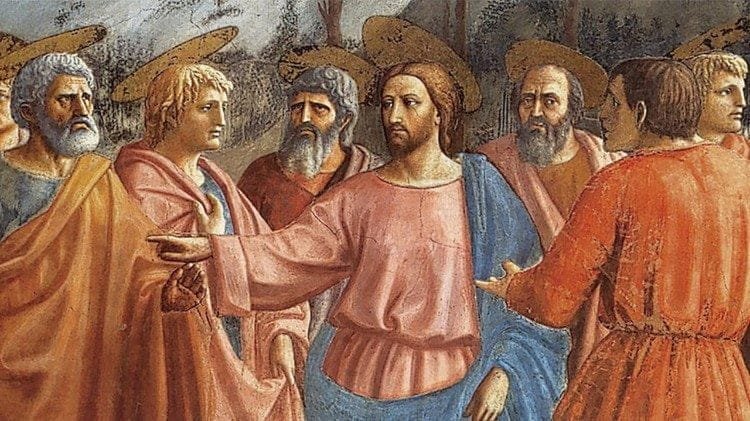DAILY MASS, GOSPEL AND COMMENTARY: “Rejoice for your names are written in heaven” (Lk 10:17–24).
The seventy disciples return from their mission
The seventy-two disciples returned rejoicing and said to Jesus, “Lord, even the demons are subject to us because of your name.” Jesus said, “I have observed Satan fall like lightning from the sky. Behold, I have given you the power ‘to tread upon serpents’ and scorpions and upon the full force of the enemy and nothing will harm you. (20) Nevertheless, do not rejoice because the spirits are subject to you, but rejoice because your names are written in heaven.”
Jesus gives thanks
At that very moment he rejoiced in the Holy Spirit and said, “I give you praise, Father, Lord of heaven and earth, for although you have hidden these things from the wise and the learned you have revealed them to the childlike. Yes, Father, such has been your gracious will. (22) All things have been handed over to me by my Father. No one knows who the Son is except the Father, and who the Father is except the Son and anyone to whom the Son wishes to reveal him.”
(23) Turning to the disciples in private he said, “Blessed are the eyes that see what you see. (24) For I say to you, many prophets and kings desired to see what you see, but did not see it, and to hear what you hear, but did not hear it.”
Gospel Commentary from the Navarre Bible, Commentary to the Gospel of St. Luke (with permission)
- 20 Our Lord corrects his disciples, making them see that the right reason for rejoicing lies in hope of reaching heaven, not in the power to do miracles which he gave them for their mission.
- As he said on another occasion, “On that day many will say to me, ‘Lord, Lord, did we not prophesy in your name, and cast out demons in your name, and do many mighty works in your name?’ And then will I declare to them, ‘I never knew you; depart from me, you evildoers’” (Mt 7:22-23)
- In other words, in the eyes of God doing his holy will at all times is more important than working miracles.
- 21 This passage of the Gospel is usually called our Lord’s “hymn of joy” and is also to be found in St Matthew (11:25-27). It is one of those moments when Jesus rejoices to see humble people understanding and accepting the word of God.
- Our Lord also reveals one of the effects of humility -— spiritual childhood. For example, in another passage he says: “Truly, I say to you, unless you turn and become like children, you will never enter the kingdom of heaven” (Mt 18:3).
- But spiritual childhood does not involve weakness, softness or ignorance:
- “I have often meditated on this life of spiritual childhood, which is not incompatible with fortitude, because it demands a strong will, proven maturity, an open and firm character. . . . To become children we must renounce our pride and self-sufficiency, recognizing that we can do nothing by ourselves. We must realize that we need grace, and the help of God our Father to find our way and keep to it. To be little, you have to abandon yourself as children do, believe as children believe, beg as children beg” (St. Josemaria, Christ is passing by, 10 and 143).
- 22 “This statement is a wonderful help to our faith”, St Ambrose comments, “because when you read ‘all’ you realize that Christ is all-powerful, that he is not inferior to the Father, or less perfect than him; when you read ‘have been delivered to me’, you confess that Christ is the Son, to whom everything belongs by right of being one in substance [with the Father] and not by grace of gift” (Expositio Evangelii sec. Lucam, in loc.).
- Here we see Christ as Almighty Lord and God, consubstantial with the Father, and the only one capable of revealing who the Father is. At the same time, we can recognize the divine nature of Jesus only if the Father gives us the grace of faith as he did to St Peter (cf. Mt 16:17).
- 23-24 Obviously, seeing Jesus with one’s own eyes was a wonderful thing for people who believed in him. However, our Lord will say to Thomas, “Blessed are those who have not seen and yet believe” (Jn 20:29). St Peter, for his part, tells us: “Without having seen him you love him; though you do not see him you believe in him and rejoice with unutterable and exalted joy. As the outcome of your faith you obtain the salvation of your souls” (1 Pet 1:8-9).
VIDEO COMMENTARY
TOPIC: DO YOU KNOW ANYONE WHO BOASTS ABOUT THEIR ACHIEVEMENTS?
Stay updated: subscribe by email for free TO OUR NEW WEBSITE www.catholicsstrivingforholiness.org (PUT YOUR EMAIL IN THE SUBSCRIBE WIDGET).
We are also in www.fb.com/Catholicsstrivingforholiness. Kindly help more people in their Christian life by liking our page and inviting your family, friends and relatives to do so as well. Thanks in advance and God bless you and your loved ones! Fr. Rolly Arjonillo
